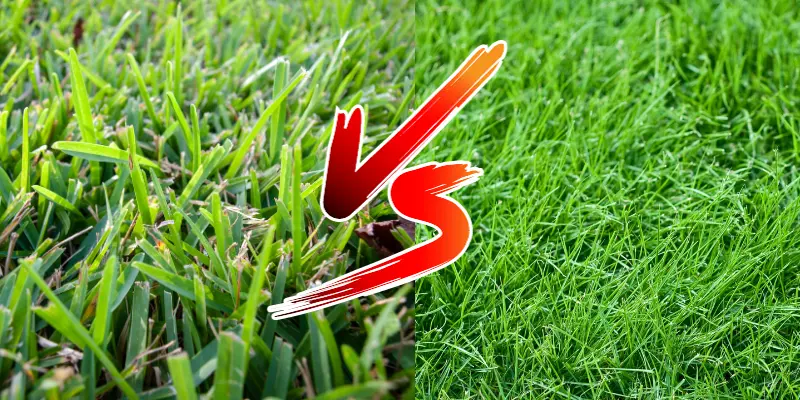St Augustine grass vs fescue grass are two popular options for yard grass, but which one is right for you? St. Augustine grass is better suited for areas with mild winters, as it is not hardy to cold weather and requires supplemental irrigation.
On the other hand, fescue grass is more active in the cold season and has excellent shade tolerance. Both grasses have their advantages and disadvantages, so it’s important to consider your specific climate and maintenance preferences when choosing the right grass for your yard.
Table of Contents
Pros And Cons
Choosing the right type of grass for your yard is an important decision that can greatly impact the overall look and health of your lawn. Two popular options to consider are St Augustine grass vs Fescue grass. Both have their own unique characteristics and advantages and some disadvantages. In this article, we will explore the pros and cons of each grass type to help you make an informed decision.
St Augustine Grass
Advantages Of St Augustine Grass
Disadvantages Of St Augustine Grass
Fescue Grass
Advantages Of Fescue Grass
Disadvantages Of Fescue Grass
Ultimately, the choice between St Augustine grass and Fescue grass depends on your specific needs and the environmental conditions of your yard. Consider factors such as climate, sunlight availability, amount of foot traffic, and maintenance requirements before making a decision. Consulting with a lawn care professional can also provide valuable insights and guidance.

Credit: www.ocregister.com
Choosing The Right Grass
Choosing the right grass for your yard is crucial to ensuring a healthy and beautiful lawn. With so many options available, it can be overwhelming to make a decision. Two popular choices are St Augustine grass and Fescue grass. In this article, we will explore the factors to consider when choosing between St Augustine grass vs Fescue grass, the best grass for different regions, and the maintenance requirements for each grass type.
Factors To Consider
When deciding on the type of grass for your yard, there are several factors to consider:
- Climate: Different grass types thrive in different climates. St Augustine grass is well-suited for warm and humid regions, such as the southern United States, while Fescue grass is ideal for cooler climates.
- Watering Needs: St Augustine grass requires more water and is less drought-tolerant compared to Fescue grass, which can handle dry conditions better.
- Sunlight Exposure: St Augustine grass prefers full sun to partial shade, while Fescue grass can tolerate more shade and is suitable for yards with limited sunlight.
- Maintenance: St Augustine grass requires regular mowing and fertilization, whereas Fescue grass has lower maintenance requirements.
- Soil Type: Different grass types have different soil preferences. St Augustine grass performs well in sandy and well-drained soils, while Fescue grass can adapt to a wider range of soil types.
Best Grass For Different Regions
The best grass for your yard largely depends on your region’s climate. Here are some recommendations:
| Region | Best Grass |
| Warm and Humid (e.g. Southern United States) | St Augustine Grass |
| Cooler Climates (e.g. Northeastern United States) | Fescue Grass |
It’s important to note that these are general recommendations, and you may have specific factors in your region that could influence your grass choice.
Maintenance Requirements
Understanding the maintenance requirements of each grass type is essential for keeping your lawn healthy and vibrant:
- St Augustine Grass: This grass type requires regular mowing, fertilizing, and watering. It benefits from a warm-season lawn care routine, including pest control and proper irrigation.
- Fescue Grass: Fescue grass has lower maintenance requirements compared to St Augustine grass. It requires less frequent watering, mowing, and fertilization.
By understanding the maintenance needs of each grass type, you can ensure that your yard remains lush and green throughout the year.
Frequently Asked Questions For St Augustine Grass Vs Fescue Grass Which Grass Is Right For Your Yard
What Is The Best Grass For A Perfect Lawn?
For a perfect lawn, the best grass options include Bermuda, St. Augustine, Kentucky bluegrass, Centipede, Perennial ryegrass, Buffalo grass, Zoysia, and Tall and fine fescue. Each type has its own advantages, so choose the one that suits your specific needs.
What Are The Disadvantages Of St. Augustine Grass?
St. Augustine grass has a few disadvantages. It is not suitable for cold weather and can only grow in areas with mild winters. It is also susceptible to drought and requires extra irrigation. Additionally, it needs frequent fertilization during the first three months.
Will Fescue Overtake St. Augustine?
Fescue grass can overtake St. Augustine or Bermuda grass. Fescue is more active in cold seasons, so it is important to maintain and water it during summer dormancy. Both grasses have good shade tolerance, with fescue being the best among all lawn grasses.
What Kind Of Grass Is Right For Me?
The kind of grass that is right for you depends on your location and preferences. Some popular options include Bermuda grass, St. Augustine grass, Kentucky bluegrass, Centipede grass, and Zoysia grass. Consider factors like climate, water availability, and maintenance requirements when choosing the best grass for your yard.
Conclusion
Based on the comparison between St. Augustine grass and fescue grass, it is important to consider the specific needs and conditions of your yard before making a decision. While St. Augustine grass offers a lush and thick appearance, it requires more water and maintenance.
On the other hand, fescue grass is more drought-tolerant and requires less maintenance. Ultimately, the right choice depends on factors such as climate, sunlight exposure, and personal preferences. Consulting with a local expert will ensure that you choose the grass that is best suited for your yard.


![Terrifying Trend: Why Do Roosters Chase Humans? [2024]](https://plantsandchickens.com/wp-content/uploads/2024/02/why-do-roosters-chase-humans-4.webp)


Leave a Reply